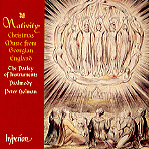If you’re familiar with this same group’s “Christmas Music from English Parish Churches, 1740-1830” (also on Hyperion–type Q7189 in Search Reviews)–and you should be, this new release continues the idea of presenting Christmas songs, anthems, hymns, and carols as sung by the more or less “ordinary” folk whose church music traditions differed significantly from those practiced in the cathedrals during the 18th and early 19th centuries. Not surprisingly, some of this music sounds like colonial American hymns and fuguing tunes, while other pieces, especially those with orchestra or other instrumental accompaniment, are stylistically owing to composers such as Handel and Haydn. In fact, the grand and glorious opening anthem by John Fawcett (Strike! Seraphs, strike your harps of gold), scored for orchestra, soprano and alto soloists, and choir, has a definite Haydn-esque cast to it–and later on in this 70-plus-minute program we’re treated to glimpses of Handel, Purcell, and even J.S. Bach in the various arrangements and original pieces.
But this is not to suggest that all of this music is derivative; rather, most of the anthems bear unique aspects that are due more to their amateur origins and thus reflect a certain charming rusticity that renders them both immediately accessible and likeable. the scoring tends to be simple, straightforward, and functional, and the tunes are, well, meant to be sung–not necessarily by professionals. Even so, there’s some fairly sophisticated music here, from John Hill’s unique and involved treatment of texts literally owned by Handel–“The people that walked in darkness/For unto us a child is born”–to Benjamin Cooke’s Angelic hymns thy natal day (from Ode for Christmas, 1763) with its absolutely beautiful Purcellian melodic lines, set for three soloists and instruments. Other highlights include Joseph Key’s lively carol Come celebrate th’ auspicious morn; the touching, harmonically rich Light of those whose dreary dwelling (arranged by Thomas Butts); a majestic setting of Joy to the world for choir and organ; and an amazing arrangement of O come, all ye faithful by Vincent Novello, for choir, soloists, orchestra, and organ.
The choral and solo singing is first rate, with special mention to soprano Philippa Hyde, and the instrumental playing and arrangements couldn’t be better. The singers wisely decided not to employ any contrived regional accents or dialects that not only could be distracting but, as Peter Holman points out in the notes, cannot be authentically re-created–and may only “strike a false note of nostalgic quaintness”. The sound is clearer, more detailed, and more impressively immediate than on Psalmody’s earlier disc. This is an outstanding and unusual Christmas CD that shouldn’t be missed. [11/26/2003]
































